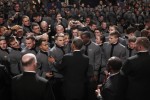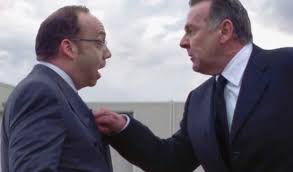In the General-McChrystal-gets-his-ass-canned story there is an underlying supposition—that Stanley McChrystal is a moron.
I’m not buying it.
 More likely, the Rolling Stone article served as a poorly worded resignation letter. General McChrystal hardly seems like a man to quit especially on something as important as the war in Afghanistan and the men who revere him. Yet clearly he felt Washington was failing to deliver the tools he needed to win the war and he ultimately feels this war in unwinnable (an assessment I share). How could he extract himself from a position in which he felt he was trapped into executing a losing strategy? And how could he do so in a manner that facilitated greater contemplation of his concerns?
More likely, the Rolling Stone article served as a poorly worded resignation letter. General McChrystal hardly seems like a man to quit especially on something as important as the war in Afghanistan and the men who revere him. Yet clearly he felt Washington was failing to deliver the tools he needed to win the war and he ultimately feels this war in unwinnable (an assessment I share). How could he extract himself from a position in which he felt he was trapped into executing a losing strategy? And how could he do so in a manner that facilitated greater contemplation of his concerns?
Retired General Barry McCaffey has commented that “The policy surrounding [McChrystal] has been too unstructured, too incoherent, too little commitment.” Commenting on the roles of the major players in the policy development and implementation, McCaffrey asks, “What’s the responsibility of Ambassador Holbrooke, of Eikenberry, of the various free agents in this whole process?”
 It was only eight months ago that McChrystal found himself in hot water for publicly advocating a broader strategy focused on winning the hearts and minds of the Afghan people but which would require an infusion of 40,000 more US troops. President Obama, in a speech at West Point, seemed reluctant when promising 30,000 more soldiers yet the Afghan war has not improved since they began arriving leaving McChrystal with the uneasy feeling that Afghan hearts and minds are not to be won, at least not in a manner facilitating a US victory in the region.
It was only eight months ago that McChrystal found himself in hot water for publicly advocating a broader strategy focused on winning the hearts and minds of the Afghan people but which would require an infusion of 40,000 more US troops. President Obama, in a speech at West Point, seemed reluctant when promising 30,000 more soldiers yet the Afghan war has not improved since they began arriving leaving McChrystal with the uneasy feeling that Afghan hearts and minds are not to be won, at least not in a manner facilitating a US victory in the region.
Bringing his concerns before the American people and raising them once again to President Obama and Congress required a new communications strategy. If forcing a policy review and public referendum on Afghanistan required him to commit hara-kiri then so be it. In fact, according to ABC’s Jake Tapper, it was McChrystal himself who pointed out to the White House that he had compromised the mission. Those aren’t really the words of a man desperate to keep his job.
There are, in fact, very few quotes directly attributable to General McChrystal in the Rolling Stone article. Most of he derogatory comments were overheard by its author Michael Hastings and came from the mouths of staffers and assistants. Why was Hastings allowed such access to private conversations and events where alcohol loosened lips in the first place? McChrystal’s PR advisor, Duncan Boothby–since sacked–is hardly a neophyte; and Rolling Stone’s reputation for immersion journalism is well known. There is significant plausible deniability in the context. Almost to a man, those quoted would certainly point out that if conducting a proper interview their words would have been more decorous and supportive of US policy. Rather, they’d continue, they were just venting and while this event is unfortunate, it certainly wasn’t insubordinate. At least, that would be my story.
 Phase I of McChrystal’s plan is complete—he has removed himself from this debacle and done so in a way which preserves his integrity and paints him as a brutally honest truth-teller—no one’s lap-dog he.
Phase I of McChrystal’s plan is complete—he has removed himself from this debacle and done so in a way which preserves his integrity and paints him as a brutally honest truth-teller—no one’s lap-dog he.
Phase II—the President’s review—seems clearly to have fallen on deaf ears so far, though it was successful in providing the Obama administration an opportunity to carefully review its own policies in light of the current situation. While demoting another American hero, General David Petraeus, to McChrystal’s old job, Obama said, “This is a change in personnel not in policy. We will not a miss a beat because of the change in command in the Afghan theater.”
Phase III—a review of Afghan policy while Congress considers a new $33.5 billion supplemental appropriation bill—may yet be effective. House Speaker Nancy Pelosi has denied a link between the bill and McChrystal’s ouster, but Kate Hunter, writing in Roll Call (June 24, 2010), comments that liberals are seeking a delay on the vote “until ‘serious questions and concerns’ about the war in Afghanistan that were raised in an explosive Rolling Stone article have been addressed.”
As McChrystal dusts off his resume and begins considering high paying consulting jobs, one thing is clear to me—this was a win/win/win/win strategy. McChrystal gets to leave with his reputation in tact, Obama has a chance to reflect, Congress has a chance to get involved, and the American people, from both parties, must pause and consider why such a well respected General is so concerned about US strategy in Afghanistan.
It makes more sense to me that this was a well thought out strategy with defined goals rather than a week-long exercise of poor judgment by a collection of ambitious, successful leaders. So, yeah, I’m not buying the moron-thing.

 As I thought about that later though, I don't feel that way at all. Honestly, I don't know how Disney delivers as much as they do for so little money. $60 for park admission seems high, yes. But look at the infrastructure, the options, the employees, the transportation. I can't believe they do it for as little as they do. Personally, I think it's a tremendous value and worth every penny I spent.
As I thought about that later though, I don't feel that way at all. Honestly, I don't know how Disney delivers as much as they do for so little money. $60 for park admission seems high, yes. But look at the infrastructure, the options, the employees, the transportation. I can't believe they do it for as little as they do. Personally, I think it's a tremendous value and worth every penny I spent. 









 But on the more important substantive issues, it was full of contradictions and misleading statements. He talked about being knocked down as a child and how his mother taught him to pick himself up. (Great lesson) Later, though, he lamented that at a time when so many Americans have been knocked down, Washington has done so little to help them get back up. (I thought, Senator, the point was to learn to pick YOURSELF up.)
He talked about how the most important aspect of work is that it provides the benefit of dignity and respect to Americans; but he then prattled on about how the work people have doesn't pay enough.
He talked about how tax breaks for corporations, which McCain supports, send jobs overseas. No, Joe, they don't. Tax breaks for corporations brings jobs home; companies have been sending jobs overseas because it already costs TOO MUCH to do business within the US.
He talked about a "promise that their tomorrow will be better than their yesterday." Who is making that promise, Senator? Only we can make our tomorrow better. Government can't and if government is promising that, and Americans want that, then this is the discussion that we should be having in America.
He quoted John McCain on Afghanistan from 3 years ago and Barack Obama on Afghanistan from 1 year ago. Why not break out a quote from McCain on Georgia from years ago and a quote from Obama on Georgia from last week?
Viewers of this speech who pay attention to his words, will not have been impressed with the content or the medium.
But on the more important substantive issues, it was full of contradictions and misleading statements. He talked about being knocked down as a child and how his mother taught him to pick himself up. (Great lesson) Later, though, he lamented that at a time when so many Americans have been knocked down, Washington has done so little to help them get back up. (I thought, Senator, the point was to learn to pick YOURSELF up.)
He talked about how the most important aspect of work is that it provides the benefit of dignity and respect to Americans; but he then prattled on about how the work people have doesn't pay enough.
He talked about how tax breaks for corporations, which McCain supports, send jobs overseas. No, Joe, they don't. Tax breaks for corporations brings jobs home; companies have been sending jobs overseas because it already costs TOO MUCH to do business within the US.
He talked about a "promise that their tomorrow will be better than their yesterday." Who is making that promise, Senator? Only we can make our tomorrow better. Government can't and if government is promising that, and Americans want that, then this is the discussion that we should be having in America.
He quoted John McCain on Afghanistan from 3 years ago and Barack Obama on Afghanistan from 1 year ago. Why not break out a quote from McCain on Georgia from years ago and a quote from Obama on Georgia from last week?
Viewers of this speech who pay attention to his words, will not have been impressed with the content or the medium.  However, the speech itself probably did little. She certainly had nothing to say that might sway Republicans to rethink their party affiliation. Furthermore, absent too were talking points that independents might find attractive. The speech seemed to have two purposes. First, convince her supporters to vote for Obama. But who else were they going to vote for? Those people involved enough in politics to be at or watch on tv the DNC convention are also likely to be people who will value their vote and not stay at home. Those who might elect not to vote at all, certainly were not in attendance and might well have been watching America's Got Talent and missed the speech completely.
Secondly, and more importantly to Mrs. Clinton, the speech was littered with reminders of why she should remain relevant in the Democratic Party. This was a "You Picked the Wrong Guy" speech.
Will we remember her or this speech in 4 or 8 years? I suspect not. The speech didn't brand itself with any tag lines that might survive the next few years. But it was a hell of an effort.
However, the speech itself probably did little. She certainly had nothing to say that might sway Republicans to rethink their party affiliation. Furthermore, absent too were talking points that independents might find attractive. The speech seemed to have two purposes. First, convince her supporters to vote for Obama. But who else were they going to vote for? Those people involved enough in politics to be at or watch on tv the DNC convention are also likely to be people who will value their vote and not stay at home. Those who might elect not to vote at all, certainly were not in attendance and might well have been watching America's Got Talent and missed the speech completely.
Secondly, and more importantly to Mrs. Clinton, the speech was littered with reminders of why she should remain relevant in the Democratic Party. This was a "You Picked the Wrong Guy" speech.
Will we remember her or this speech in 4 or 8 years? I suspect not. The speech didn't brand itself with any tag lines that might survive the next few years. But it was a hell of an effort. I believe not attending to these differences is the cause of the apparent divide in American thought. True conservatism (not that practiced by the Republicans) understands the importance of relationships between people and values those relationships over the individual. The whole is indeed greater than the sum of the parts. Liberal ideology seeks to raise the needs and desires of the individual above the collective good. This is where the Libertarians lose most Americans. Intuitively, Americans sense the error of the "my liberty is more important than the collective good" ethos and shun the movement. Neither the modern Democratic Party nor the Republican Party has found a way to tap into the American belief in Freedom while simultaneously bonding us to society. This is the time for Democratic and Republican ideologies to be replaced by less "me" centered thinking and our nation should return to its ideological roots, which means that we understand our obligation to each other to value and defend each other's freedom, not just our own.
I believe not attending to these differences is the cause of the apparent divide in American thought. True conservatism (not that practiced by the Republicans) understands the importance of relationships between people and values those relationships over the individual. The whole is indeed greater than the sum of the parts. Liberal ideology seeks to raise the needs and desires of the individual above the collective good. This is where the Libertarians lose most Americans. Intuitively, Americans sense the error of the "my liberty is more important than the collective good" ethos and shun the movement. Neither the modern Democratic Party nor the Republican Party has found a way to tap into the American belief in Freedom while simultaneously bonding us to society. This is the time for Democratic and Republican ideologies to be replaced by less "me" centered thinking and our nation should return to its ideological roots, which means that we understand our obligation to each other to value and defend each other's freedom, not just our own. The Democratic support that the super delegates are so keen on being a part of should be viewed as something of a mirage. What would the delegate count be if the events of the last month had taken place in December? Would Obama have as much support as he does now? Would he be the presumed candidate? And yet the Obama of today is the one the Democrats are likely to insist represents their party. The Obama that sees middle America as "clingers," the Obama that wouldn't repudiate Wright but is now quite right to repudiate, this is the Obama that will face McCain in November. For a party as down on America as this one, an Obama nomination seems awfully optimistic. Perhaps, it's not just Michigan and Florida that need a do-over: perhaps the Democrats ought to have a national do-over.
The Democratic support that the super delegates are so keen on being a part of should be viewed as something of a mirage. What would the delegate count be if the events of the last month had taken place in December? Would Obama have as much support as he does now? Would he be the presumed candidate? And yet the Obama of today is the one the Democrats are likely to insist represents their party. The Obama that sees middle America as "clingers," the Obama that wouldn't repudiate Wright but is now quite right to repudiate, this is the Obama that will face McCain in November. For a party as down on America as this one, an Obama nomination seems awfully optimistic. Perhaps, it's not just Michigan and Florida that need a do-over: perhaps the Democrats ought to have a national do-over. Sure he's liberal. Liberal we can handle. Heck even socialist we can handle. We have systems in place to deal with presidential initiatives which we ultimately don't approve of. But relinquishing any control to any kind of world organization is very troubling. Being outside of our borders and constitution, we could find ourselves subject to a body we don't agree with and yet have few ways to get out from under its jurisdiction. This is a slippery slope. I fear Obama's need to be liked and validated will prompt him to try to enter the U.S. into many global initiatives.
Sure he's liberal. Liberal we can handle. Heck even socialist we can handle. We have systems in place to deal with presidential initiatives which we ultimately don't approve of. But relinquishing any control to any kind of world organization is very troubling. Being outside of our borders and constitution, we could find ourselves subject to a body we don't agree with and yet have few ways to get out from under its jurisdiction. This is a slippery slope. I fear Obama's need to be liked and validated will prompt him to try to enter the U.S. into many global initiatives. Hillary, despite her belief that her ascension has been preordained, has a low ceiling and a high floor. Obama continues to manifest himself as a divisive candidate, creating his own new voting demographic within his party, one that surely will never be as influential as, say, the evangelicals have been for the GOP. It is no wonder that Clinton supporters would sooner vote for McCain, the two have significantly more in common and, to their credit, Clinton supporters can see through the audacity of hype. The sad fact for the democrats is that these two represented the best the Democrats had to offer. Perhaps it is a tacit admission of poor policy that the Democrats chose two candidates who are best known for their celebrity status and not their policies or experience. If the policy postulates of the democrats had more merit, a "celebrity" wouldn't have be needed to endorse those policies.
Hillary, despite her belief that her ascension has been preordained, has a low ceiling and a high floor. Obama continues to manifest himself as a divisive candidate, creating his own new voting demographic within his party, one that surely will never be as influential as, say, the evangelicals have been for the GOP. It is no wonder that Clinton supporters would sooner vote for McCain, the two have significantly more in common and, to their credit, Clinton supporters can see through the audacity of hype. The sad fact for the democrats is that these two represented the best the Democrats had to offer. Perhaps it is a tacit admission of poor policy that the Democrats chose two candidates who are best known for their celebrity status and not their policies or experience. If the policy postulates of the democrats had more merit, a "celebrity" wouldn't have be needed to endorse those policies. I'm afraid I just don't believe that her feelings are the result of poorly timed contemplation. My understanding is that the family was present for the photo shoot and got to see the picture in advance. They liked it and moved on. NOW all of a sudden Miley is embarrassed? These are smart people familiar with the media. I, of course, have no inside information, this is just my opinion, but it would appear she wants to have her cake and eat it too: do the photo shoot (be edgy, become known to new demographics) and then make a heartfelt apology to appease the core fan group.
I'm afraid I just don't believe that her feelings are the result of poorly timed contemplation. My understanding is that the family was present for the photo shoot and got to see the picture in advance. They liked it and moved on. NOW all of a sudden Miley is embarrassed? These are smart people familiar with the media. I, of course, have no inside information, this is just my opinion, but it would appear she wants to have her cake and eat it too: do the photo shoot (be edgy, become known to new demographics) and then make a heartfelt apology to appease the core fan group. Is Obama smart enough to see the error of his proposal to meet with such foreign leaders? Probably not. Too impressed with his own palaver, he'll stand by his words. But can McCain and the GOP make the same connection and exploit Carter's follies as empirical evidence that they were correct in postulating what such visits from US dignitaries would bring about?
Is Obama smart enough to see the error of his proposal to meet with such foreign leaders? Probably not. Too impressed with his own palaver, he'll stand by his words. But can McCain and the GOP make the same connection and exploit Carter's follies as empirical evidence that they were correct in postulating what such visits from US dignitaries would bring about? His words address the inherently conservative values (not republican--conservative) most Americans believe in. But he also points out that while we believe in them, we don't LIVE them. His article can be, and should be, a call for personal change. It will be an exciting read for the number of times you exclaim (too loudly for those sipping coffee nearby) "Yes!" Although, if I'm honest, it is depressing on a national scale because I know most Americans act on their immediate desires and not on the values they hold most sacred. But, in the end, change starts at home.
His words address the inherently conservative values (not republican--conservative) most Americans believe in. But he also points out that while we believe in them, we don't LIVE them. His article can be, and should be, a call for personal change. It will be an exciting read for the number of times you exclaim (too loudly for those sipping coffee nearby) "Yes!" Although, if I'm honest, it is depressing on a national scale because I know most Americans act on their immediate desires and not on the values they hold most sacred. But, in the end, change starts at home.
I love the picture of the lap dog.., I would like to use it in a story I producing. Is this dog picture yours?
Will Roberts – TweetTheStreets.com
BTW- we are always looking for writers.
Thank for nice article..I like it
Also visit my web site:: snazzy